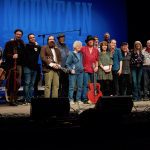REM contest
The fact that Murmur & Reckoning were written and recorded in the early 80’s without the use of a single synthesizer is in itself a small miracle. I’m sure there was plenty of music being made around that time that could be called roots music or Americana, but none of it appealed to me like R.E.M. There is something mysterious about those first few R.E.M. albums; nothing else that came out around the same time sounded anything like it.
Murmur sounded dark, and the cover made it sound darker. The first time I heard it, I wanted to adjust the EQ or something so I could understand the lyrics. There’s nothing quite like hearing a song and instantly relating, but not knowing why. I wore out my cassette of Murmur trying to decipher it. It dawned on me weeks later that the title was some sort of sick inside joke. The guitar on that album was fantastic- muddy and precise at the same time. I didn’t think it was a guitar at first. It sounded that different. Murmur has so many layers, but you can hear every one.
Reckoning marked the arrival of R.E.M. for me. Murmur might have been a fluke. When it came out, Reckoning was an affirmation of what Murmur had promised. It has a much brighter sound, and it was the first time I could understand most of the words on first listen, but hearing did not bring understanding. The lyrics themselves are cryptic and difficult, but somehow make perfect sense in context. The images of water, time, trees, flooded catacombs and water towers don’t seem to go together at first, but they work together in these songs.
The instrumentation and arrangement on 7 Chinese Bros. and Time After Time (Annelise) are fantastic. Those two songs in particular have a certain modal drone punctuated by clean percussion that makes me want to listen to them again and again. And Camera is Reckoning’s powerful emotional centerpiece.
I’m not sure how these 2 albums really changed the music scene at the time, but they laid a foundation for R.E.M., who went on to inspire a whole lot of musicians by writing great songs that could be learned and played. And that’s what folk is all about.




